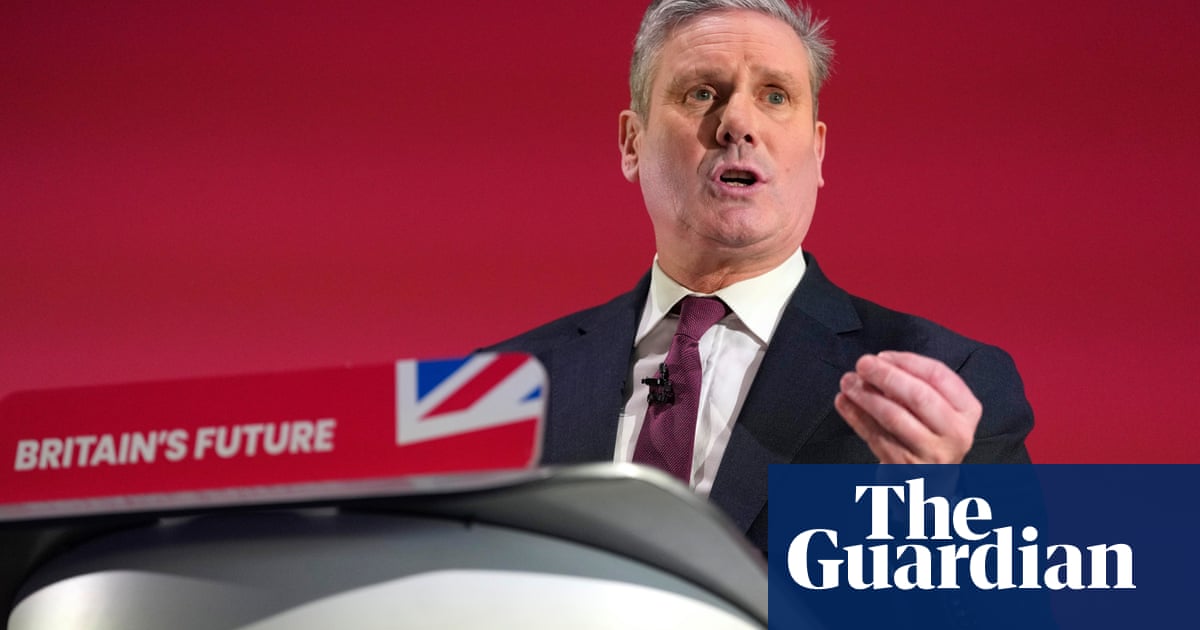
Labour is planning only limited first-term reforms of social care and the House of Lords and a smaller green investment plan as part of a stripped-down general election manifesto, as it seeks to make its policies “bombproof” to Tory attacks.
Shadow cabinet ministers have been given until 8 February to make policy submissions for the manifesto, as Keir Starmer’s party gears up for an election that, according to opinion polls, looks likely to return it to government for the first time since 2010.
A committee of shadow ministers and officials will then assess which commitments will require legislation in a king’s speech that will be delivered within weeks of entering office.
The party intends to have both documents ready by mid-March, in case Rishi Sunak calls an early spring poll.
The Observer understands that as well as backing away from its £28bn a year commitment on green investment (while sticking to the overall drive to achieve clean energy by 2030), Labour will not seek to legislate on the creation of a new national care service in its first king’s speech.
Instead, it will focus on a fair pay agreement for care workers as well as issues of recruitment and retention, as part of a wider workers’ rights bill. Its plans for a complete overhaul of social care will, however, be presented as a longer-term mission taking at least 10 years and two parliaments.
In addition, despite Keir Starmer’s previous promises to abolish the Lords in a first term, it is expected to commit only to limited changes. This is likely to mean legislating only for the abolition of the remaining 91 hereditary peers.
Labour’s cautious approach – which is frustrating some MPs and party members – is partly the result of uncertainty about the economic situation it will inherit and what can be afforded.
But shadow ministers are also determined to offer as small a target as possible to the Tories on issues such as social care, which in the past have turned election campaigns upside down. In 2010, Labour’s care plans were branded a “death tax” by the Conservatives, and hit the party’s vote badly, while in 2017 Theresa May’s campaign suffered irreparable damage amid accusations she was planning a “dementia tax”.
On social care, Starmer’s party has rallied the unions behind its more gradual approach. Unison’s general secretary, Christina McAnea, told the Observer: “Care is in crisis and the need for a national service has never been greater. But the sector is complex and, with many thousands of care employers, creating a new system isn’t a five-minute job.
“In stark contrast to the litany of broken promises from this government, Labour is committed to reforming care. Under the proposed fair pay agreement, wages will rise and care workers earn the same no matter where they work in England.
“Care jobs will immediately become more attractive, and the sector be able to start filling the huge hole in its workforce. That will boost support to everyone needing care and begin to lift the pressure on the NHS.”
With its green prosperity plan now being talked down, Labour’s new “flagship” policy is increasingly seen as its new deal for working people, which involves handing workers new rights from their first day of employment, as well as the abolition of zero-hours contracts. The deal, fiercely guarded by deputy leader Angela Rayner, also includes a ban on “firing and rehiring”.
Another bill that is likely to be prioritised will be a “fiscal lock” that will force government to submit all tax and spending plans to the Office for Budget Responsibility for its judgment before pressing ahead.
The aim is to contrast Labour’s commitment to fiscal discipline with the disastrous decision-making of the Liz Truss government, which caused near panic on financial markets.
Elsewhere, Labour’s pledge to roll out breakfast clubs to every primary school in England, funded by the abolition of non-dom tax status, remains prominent in the manifesto.
There are also hopes internally that a big childcare pledge could form part of Labour’s programme in a first term, with the party keen on expanding the number of nurseries attached to primary schools to tackle a huge shortage of places and staff. The former Ofsted head, Sir David Bell, is studying the issue for Labour, but is unlikely to report in time for an election before the autumn.
The party’s pledge to raise more tax from private equity managers has also come in for scrutiny. Shadow chancellor Rachel Reeves has vowed to raise the amount charged on profits they earn on deals, to match the 45p top rate of income tax. However, some in the party are said to be keen to water down the plan, fearful of deterring investment and denting Labour’s pledge to make the UK the fastest-growing economy in the G7 group of developed countries. Party sources insisted the plan remained to tax such profits as income.
The manifesto will also make much of a pledge to build 300,000 homes a year – a target in the last Conservative manifesto that has not been achieved. Starmer’s willingness to take on those who want to prevent any building on “greenfield” sites is used by Labour insiders to show the Labour leader is willing to take on potentially difficult battles, rather than always take a cautious path.












